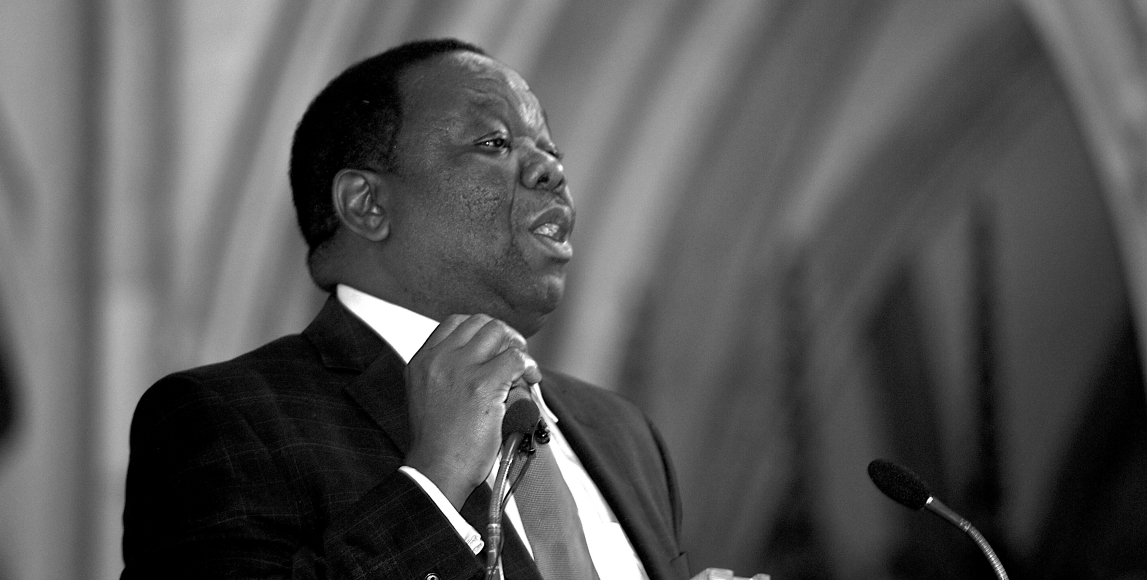Following a military coup last week in Zimbabwe, the president Robert Mugabe stepped down on Tuesday evening after 37 years in power, paving the way for his former deputy Emmerson Mnangagwa to take control as the interim leader until elections, planned for 2018.
Speaking to the Daily Vox on Wednesday, Movement for Democratic Change (MDC) member of parliament, and party policy coordinator Eddie Cross said that the party “welcomes the removal of Mr. Mugabe,†but stated that they are “still apprehensive about the future [of Zimbabwe]â€. He says the MDC will not respond to anything but a “direct approach†from the nation’s next presumptive leader, Emmerson Mnangagwa, towards the MDC president Morgan Tsvangirai.
According to Cross, the ruling Zanu-PF has not approached the MDC so far.
Cross said that the preconditions to the party’s involvement in the Mnangagwa administration were: a return to a democratic government as soon as possible, that the election will be held under international supervision, and that it was conditional on the return to a rule of law based on the 2013 constitution.
He was responding to rumours that Tsvangirai would become the country’s next prime minister under Emmerson Mnangagwa’s proposed new rule. Cross said that the party had not received “any approaches from anybody.“
Cross also said there is zero chance for free and fair elections in the incoming regime unless radical reform takes place.
The MDC’s shadow ambassador in South Africa, Austin Moyo, said that the opposition will not “just be going into the new regime,†but will take heed of the electoral, media and security sectors to ensure that the 2018 elections take place on a level playing field.
Moyo stated that the involvement of Southern African Development Community (SADC), the African Union and the United Nations in the upcoming elections should be long term, and that the organisations should be visible now in monitoring both the registration and election processes.
He also noted that judging from the past and SADC’s “disappointing†involvement in the electoral procedures in 2008, “it cannot be promised†that it will make sure there is a free and fair election.
The MDC’s reluctance towards the Zanu-PF regime goes back a long way, but was strengthened after the 2008 elections.
Mugabe was endorsed as the presidential candidate within Zanu-PF while his main rival Tsvangirai ran under the MDC-T (Movement for Democratic Change – Tsvangirai). The election saw the MDC-T win 99 house of assembly seats while the ruling Zanu-PF won 97 and Arthur Mutambara’s MDC-M faction winning 10 seats. But there were suspicions surrounding the Zimbabwe Electoral Commission withholding results in support of the ruling Zanu PF party.
A run-off was declared by the electoral commission, and Tsvangirai won 48% to Mugabe’s 43%. A delay in the run-off led to a countrywide outbreak of violence, based on speculation from reports of Mugabe working alongside the Joint Operation Command to plan a spoiling strategy during the period from the announcement of the elections to the run off.
Following the displacement of nearly 200 000 people, the destruction of about 10 000 homes and injury to another 10 000 in the post-electoral violence, Tsvangirai informed the electoral commission that he was withdrawing from the election. His reasons included threats of war, intimidation of MDC supporters, the MDC’s lack of access to state media, and the electoral commission’s failure to ensure free and fair elections. Despite his withdrawal, Zanu-PF officials said that they would not accept defeat in an election because the nation had been liberated through war and not the ballot box and Mugabe was announced as the winner, holding 90% of the vote once a run-off result was included.
The 2008 election was condemned by a wide array of observer missions including SADC, and Tsvangirai called for Thabo Mbeki who mediated the 2008 elections to step down from his role because of perceived bias towards Mugabe.
In a letter that Tsvangirai addressed to Mbeki on May 13 2008, he says that the MDC welcomed SADC’s “mediation initiativeâ€, but stated that the party “took exception†towards Mbeki’s involvement and his lack of acknowledgement of the crisis in Zimbabwe during the 2008 elections.
The MDC was formed in February 1999 on the basis of carrying on the struggle of the people of Zimbabwe and was the first party to defeat Mugabe since the 1980 elections under the leadership of Tsvangirai. The party that has often been characterised by infighting underwent a split in 2005 following a disagreement on a decision whether or not to participate in the 2005 Zimbabwe senatorial elections. The split resulted in the MDC Secretary General, Welshman Ncube, breaking away to launch a new MDC faction, while Tsvangirai still maintained the MDC-T party. Tsvangirai was the former prime minister of Zimbabwe between 2009-2013 and president and founding member of the MDC party in 1999. In 2016, Tsvangirai was diagnosed with colon cancer and is undergoing treatment but he continues to believe that he can lead the MDC.
Nelson Chamisa, deputy president of MDC, has expressed continued support of Tsvangirai in spite of his illness. He said he will not be taking over as Tsvangirai is well and ready for victory in the upcoming elections. “I think the correct message is to ask him to step up and to encourage every Zimbabwean to vote,†said Chamisa.
This was a sentiment echoed by Moyo. “For now, we are working towards next year August or September to go to elections,†he said.
Reporting by Ethel Nshakira and Umamah Bakharia
Editor’s note: An earlier version of the article referred to the MDC shadow ambassador as Arthur Moyo. This has been amended. We regret the error. Â









